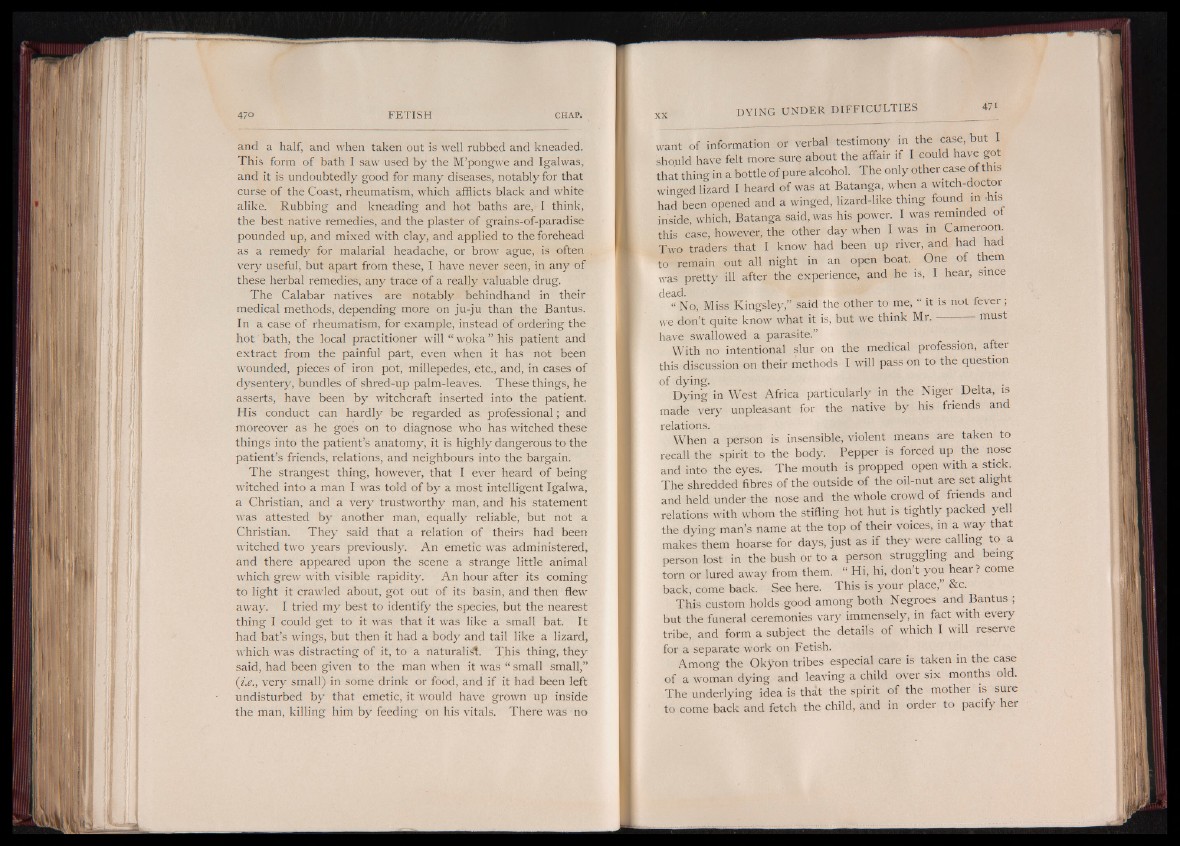
and a half, and when taken out is well rubbed and kneaded.
This form of bath I saw used by the M’pongwe and Igalwas,
and it is undoubtedly good for many diseases, notably for that
curse of the Coast, rheumatism, which afflicts black and white
alike. Rubbing and kneading and hot baths are, I think,
the best native remedies, and the plaster of grains-of-paradise
pounded up, and mixed with clay, and applied to the forehead
as a remedy for malarial headache, or brow ague, is often
very useful, but apart from these, I have never seen, in any of
these herbal remedies, any trace of a really valuable drug.
The Calabar natives are notably behindhand in their
medical methods, depending more on ju-ju than the Bantus.
In a case of rheumatism, for example, instead of ordering the
hot bath, the local practitioner will “ woka ” his patient and
extract from the painful part, even when it has not been
wounded, pieces of iron pot, millepedes, etc., and, in cases of
dysentery, bundles of shred-up palm-leaves. These things, he
asserts, have been by witchcraft inserted into the patient.
His conduct can hardly be regarded as professional; and
moreover as he goes on to diagnose who has witched these
things into the patient’s anatomy, it is highly dangerous to the
patient’s friends, relations, and neighbours into the bargain.
The strangest thing, however, that I ever heard of being
witched into a man I was told of by a most intelligent Igalwa,
a Christian, and a very trustworthy man, and his statement
was attested by another man, equally reliable, but not a
Christian. They said that a relation of theirs had been
witched two years previously. An emetic was administered,
and there appeared upon the scene a strange little animal
which grew with visible rapidity. An hour after its coming
to light it crawled about, got out of its basin, and then flew
away. I tried my best to identify the species, but the nearest
thing I could get to it was that it was like a small bat. It
had bat’s wings, but then it had a body and tail like a lizard,
which was distracting of it, to a naturalist. This thing, they
said, had been given to the man when it was “ small small,”
{i.e., very small) in some drink or food, and if it had been left
undisturbed by that emetic, it would have grown up inside
the man, killing him by feeding on his vitals. There was no
want of information or verbal testimony in the case, but I
should have felt more sure about the affair if I could have got
that thing in a bottle of pure alcohol. The only other case of this
winded lizard I heard of was at Batanga, when a witch-doctor
had'been opened and a winged, lizard-like thing found m-his
inside, which, Batanga said, was his power. I was reminded ot
this case, however, the other day when I was in Cameroon.
Two traders that I know had been up river, and had had
to remain out all night in an open boat. One of them
was pretty ill after the experience, and he is, I hear, since
dead. . .
“ No, Miss Kingsley,” said the other to me, “ it is not fever ;
we don’t quite know what it is, but we think Mr.---------must
have swallowed a parasite.”
With no intentional slur on the medical profession, after
this discussion on their methods I will pass on to the question
of dying.
Dying in West Africa particularly in the Niger Delta, is
made very unpleasant for the native by his friends and
relations.
When a person is insensible, violent means are taken to
recall the spirit to the body. Pepper is forced up the nose
and into the eyes. The mouth is propped open with a stick.
The shredded fibres of the outside of the oil-nut are set alight
and held under the nose and the whole crowd of friends and
relations with whom the stifling hot hut is tightly packed yell
the dying man’s name at the top of their voices, in a way that
makes them hoarse for days, just as if they were calling to a
person lost in the bush or to a person struggling and being
torn or lured away from them. “ Hi, hi, don’t you hear? come
back, come back. See here. This is your place, &c.
This custom holds good among both Negroes and Bantus ;
but the funeral ceremonies vary immensely, in fact with every
tribe, and form a subject the details of which I will reserve
for a separate work on Fetish.
Among the Okyon tribes especial care is taken in the case
of a woman dying and leaving a child over six months old.
The underlying idea is that the spirit of the mother is sure
to come back and fetch the child, and in order to pacify her